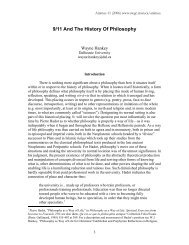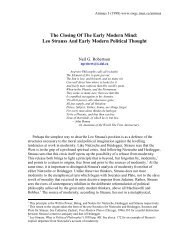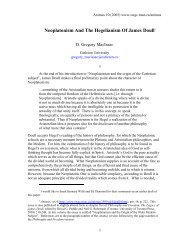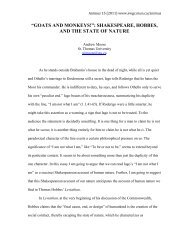Floy E Andrews, On Reading Philosophy after Analytic Philosophy.
Floy E Andrews, On Reading Philosophy after Analytic Philosophy.
Floy E Andrews, On Reading Philosophy after Analytic Philosophy.
Create successful ePaper yourself
Turn your PDF publications into a flip-book with our unique Google optimized e-Paper software.
ANDREWS: ON READING PHILOSOPHY AFTER ANALYTIC PHILOSOPHY<br />
What has been said about logical appraisal in syntactic formal systems can be<br />
extended, mutatis mutandis, to semantic formal systems. In both cases, the conceptions of<br />
`validity', `deducibility' are strictly system-relative. 12<br />
In spite of these well-known, unimpeachable characteristics of the system of PM (or<br />
B), now called "classical logic", it is not uncommon to find in commentary on the<br />
arguments of past philosophers an analysis of such arguments by the methods of<br />
"classical logic", most often to show the invalidity of the arguments in question. Without<br />
reservation or so much as a "by your leave", the argument is symbolized, its invalidity<br />
duly noted, and it is summarily dismissed, not as invalid-in-the-system-of-PM, but as<br />
objectively invalid. Textbooks on logic, especially those that carry such titles as A<br />
Logical Introduction to <strong>Philosophy</strong> 13 provide notable examples. But so does the world of<br />
scholarship. For example, G.E.M.Anscombe in the her An Introduction to Wittgenstein's<br />
Tractatus:<br />
Frege also gave us the modern conception of `quantification', which is so<br />
useful and in such general use in logic that we regard it as we regard the<br />
wheel, forgetting its inventor. Quantification essentially consists in<br />
reformulating `Everything is heavy' as : `For all x, x is heavy; and<br />
`Something is heavy' as: `For some x, x is heavy' or ` There is an x such<br />
that x is heavy'. These are written in a symbolic notation.<br />
The general reader may wonder at first whether the interest of such a<br />
device is not purely technical. It is easy to bring out that this is not so; it is<br />
of great general interest in philosophy.<br />
For example, this formulation supplies us with a perspicuous refutation of<br />
the celebrated <strong>On</strong>tological Argument of Descartes: people have been<br />
generally agreed that, but not how, it is to be refuted. According to the<br />
<strong>On</strong>tological Argument the notion of God involves that of existence, as that<br />
of a triangle involves the various properties of a triangle; therefore, God<br />
exists. Let us concede the premise. (There is even good ground for it in<br />
that fact that e.g. `There used to be a God, but isn't any more' seems to<br />
conflict with the concept `God'.) The premise should be stated as follows:<br />
Just as, if anything is a triangle, it has those properties, so if anything is<br />
God, it must possess eternal existence. This is fair; we must be permitted<br />
to take seriously the argument about triangles which Descartes relies on.<br />
But in the sense in which the conclusion `God exists' is intended, it means<br />
that there is a God. And that by no means follows from the premise. For,<br />
quite generally, from `For all x, if Fx, then Gx, we cannot infer: `There is<br />
12 Ibid., 13-14. She remarks further, "...formal logical systems aim to formalise informal arguments, to<br />
represent them in precise, rigorous and generalisable terms; and an acceptable formal logical system ought<br />
to be such that, if a given informal argument is represented in it by a certain formal argument, then that<br />
formal argument should be valid in the system just in case the informal argument is valid in the extrasystematic<br />
sense. ... In fact, there is like to be a quite complex process of adjustment."<br />
13 By Richard Purtill, New Jersey, 1989.<br />
96

















